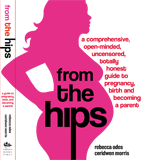asthma and pregnancy
I asked my pregnant (and asthmatic) sister if she could explain the deal with pregnancy and asthma … She wrote me such a thorough and amazing response, I asked her if I could post it on thenewmom.com. Maybe this will be useful to asthmatic moms-to-be. Thank you Catrin.
WHAT IT FEELS LIKE
You know how you get easily winded when preggers? Like there isn't enough room or time to get the air you need? Well asthma is like that—but much more intense. Wheezing is the soundtrack of asthma. When I have asthma, I can hear the air whistling through the tight, inflamed airways (bronchial tubes) in my chest. It is often worse at night and when I am lying down. It is worse when our cat Fred is too clingy or when he sleeps near my face. And it is worse when I do anything active (which ain’t much these days), like carrying groceries, doing the laundry, or walking more than a few blocks. And my asthma feels worse after I eat—as if there isn't room for the food and the pee and the lungs and the baby in one body!
ASTHMA'S EFFECT ON PREGNANCY
Does asthma get worse during pregnancy? In other words, does pregnancy exacerbate asthma? The effect of pregnancy on preexisting asthma varies from person to person (shocker). According to one study, asthma symptoms worsened for 35% of women, improved in 28% and stayed the same for 33%. I looked at the website for the American Academy of Allergy Asthma and Immunology and learned that asthma tends to worsen during the late second and early third trimesters, though women may experience fewer symptoms during the last four week stretch of pregnancy.
ASTHMA, PREGNANCY, and RISKS
First, the literature, my DC allergist (and my GP here in Melbourne) all agree that the risks of uncontrolled asthma far exceed the risks of most asthma medications. Basically, if the mom's breathing is compromised, the baby's oxygen supply is compromised. If asthma is well-treated and under control, there is no greater risk of complications during pregnancy and birth than there is for non-asthmatic women. So that is reassuring. I guess the bottom line is that it is important to control the asthma.
But if the asthma is NOT controlled during pregnancy there can be serious problems, including impaired fetal growth and survival, premature birth, low birth weight, and blood pressure issues like pre-eclampsia. According to one website, “good control of asthma” means the woman is
--active without experiencing any asthma symptoms
--sleeping through the night, and not waking due to asthma symptoms; and
--attaining her personal best peak flow number. (You find out your peak flow by breathing into this special tube called a peak flow meter. It basically tests your capacity to blow out. Remember those old Primatine Mist commercials with the people blowing out birthday candles?? )
ASTHMA MEDS GENERALLY SAFE DURING PREGNANCY
According to the feds (the HHS Office on Women’s Health), inhaled asthma meds are generally safe during pregnancy—and during breastfeeding. Inhalers are often preferable because they are less likely to be passed on to the baby than oral drugs.
I use a lot (A LOT) of Ventolin (generic name is Albuterol). You’ve probably seen this ubiquitous inhaler; it’s your basic bronchodilator and tons of people use it, even fake wannabe asthmatics! Ventolin is a LIFE SAVER for me and I carry it everywhere (I could never go out without a purse because I felt naked without my inhaler!)
I have been using a lot lately because I also have a cold, which usually makes my asthma worse. (Any time my immune system is compromised, the asthma gets worse…it has always been the case). Anyway, Ventolin functions on the bronchia almost like a cortisone cream would on the skin. It gives quick-acting relief (it stops my bronchial passages from being in “spasms”) but it doesn’t harm the fetus. According to my doctors, the drug has a very short “half-life,” which means it doesn't stay in the body very long.
Another main category of meds are those that are used on a long-term basis to control asthma, including steroids and other anti-inflammatory drugs. (I have taken these before). By the way, asthma care evolves rapidly. In the 90s the preventive meds were all the rage (you take them for x number of weeks and they prevent asthma from starting in the first place so you don't rely on the “band aid” of ventolin). But then I recently heard a much-publicized study found that relying on these quick-acting inhalers like ventolin was an equally good approach with no proven risk…
Sites to check out:
http://www.aaaai.org/patients/publicedmat/tips/asthmaandpregnancy.stm
http://www.pregnancyandasthma.com/pregnancy/asthma-pregnancy-questions.asp
in pregnancy













